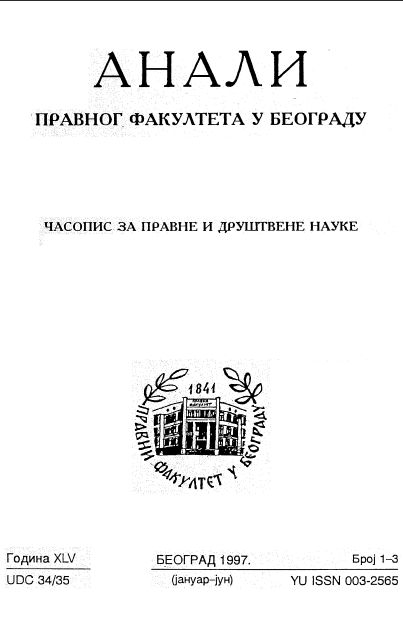МЕСТО ЦРКВЕНОГ ПРАВА У СИСТЕМУ ПРАВНИХ НАУКА И ЊЕГОВА ПОТРЕБА ДАНАС
ECCLESIASTICAL LAW TODAY AND ITS PLACE IN THE SYSTEM OF LEGAL SCIENCES
Author(s): Dimšo PerićSubject(s): Canon Law / Church Law
Published by: Правни факултет Универзитета у Београду
Keywords: Ecclesiastical Law; Canonic Law; Legal System; The Church and the State
Summary/Abstract: There are several views about the place of Ecclesiastical Law in the system of legal sciences. Some place it in the category of Public Law, others in Private, others, again, in Autonomous Law etc. Ecclesiastical Law (ius ecclesiasticum), as one of the very old legal disciplines, has demonstrated its strength and importance. The title of doctor iuris utriusque came into being precisely for this reason, because Ecclesiastical Law constitutes more than half of the legal sciences. Ecclesiastical Law is an independent legal discipline, which contains elements of Public, Private, as well as Autonomous Law. It cannot be categorised in any one of these branches of the law. Ecclesiastical Law is an independent legal discipline. Ecclesiastical Law had a rich tradition in this country. The Nomocanon of Saint Sava has been one of the most important sources of Canonic Law in the history of Ecclesiastical Law, from 883 to the present day. It is, today, the official collection of laws of the Serbian, Russian and Bulgarian churches. Since the foundation of the Lyceum in Kragujevac in 1841 (the antecedent of the Faculty of Law in Belgrade), till 1941, when the Second World War began in Yugoslavia, this subject was taught in Serbia. Besides Ecclesiastical Law, another subject known as Old Serbian Law, which incorporated elements regarding the organisation of the church and the relationship between the church and the state in medieval Serbia, was also taught at the Faculty of Law in Belgrade, between the two world wars (by the eminent professors Teodor Taranovski and Aleksandar Solovjev, Russian emigrants who came to Serbia following the Russian Revolution). After the Second World War, both these subjects were omitted from the teaching curricula and programmes of the faculties of law in Serbia. Consequently, generations of lawyers have been deprived. Literature in the Serbian language which deals with Ecclesiastical Law does not lag behind the works of authors from other countries (Greeks, Russians, Germans...), either in terms of volume, or in terms of the quality of studies. Nikodim Milas and Sergije Troicki were considered to be among the best authorities on Canonic and Ecclesiastical Law in the world. In contrast to this discontinuity, Greece has preserved the teaching of this subject throughout. Ecclesiastical Law has always been studied at its faculties of law, and Canonical Law at its faculties of theology. The return of Ecclesiastical Law, currently as an optional subject at the Faculty of Law in Belgrade, has partly corrected the injustice done to the science of Ecclesiastical Law. We consider that the reinstatement of Ecclesiastical Law will signify the recuperation of legal science, its enlightenment and, why not, its consecration. Law is the gift of God to mankind. Not everyone can be a judge, only those who are trained for it and have received their calling from the Almighty. If there is no fear of God, this gift can be abused. Hence, the elements of legal ethics are inherent to Ecclesiastical Law.
Journal: Анали Правног факултета у Београду
- Issue Year: 45/1997
- Issue No: 1-3
- Page Range: 110-122
- Page Count: 13
- Language: Serbian

